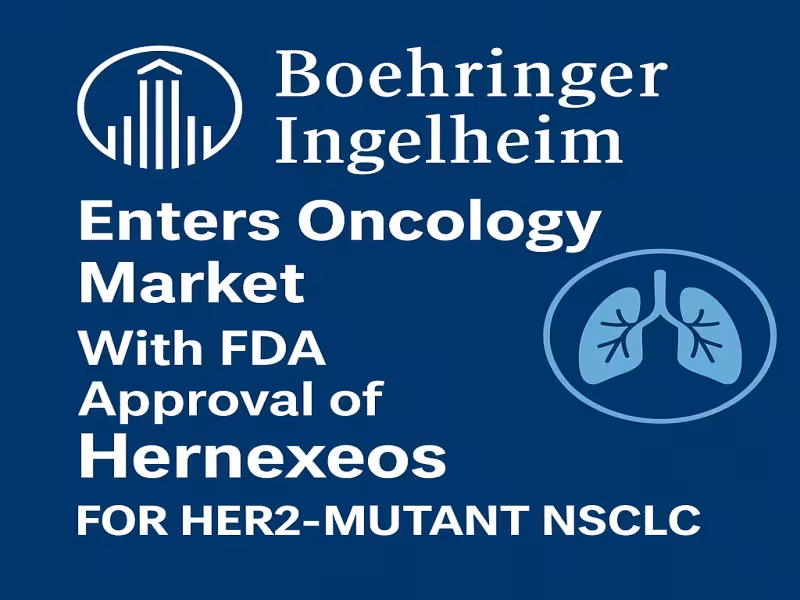
SHERIDAN, WYOMING – August 11, 2025 – Boehringer Ingelheim has secured FDA accelerated approval for its kinase inhibitor Hernexeos (zongertinib), marking the German pharmaceutical company’s first entry into the oncology market in its 140-year history. The approval positions Hernexeos as a new targeted therapy for adult patients with unresectable or metastatic non-small cell lung cancer (NSCLC) harboring HER2 tyrosine kinase domain (TKD)–activating mutations.
Targeted Innovation in HER2-Mutant NSCLC
Hernexeos is designed as an oral, selective, and irreversible HER2 inhibitor that disrupts cell growth and division driven by HER2 signaling. By directly addressing this oncogenic pathway, the drug aims to provide a new treatment option for a patient subset that historically faces poor prognoses and limited targeted therapy choices.
Clinical Data Demonstrating Strong Efficacy
The FDA approval is supported by results from the Beamion LUNG-1 Phase I trial and subsequent Phase III data:
- Confirmed ORR of 71% in TKD-mutated patients
- Median progression-free survival of 12.4 months
- 48% ORR in patients previously treated with a HER2-directed antibody-drug conjugate
- Intracranial response rate of 33% in patients with brain metastases
The therapy also demonstrated a favorable safety profile, with only 2.9% of patients discontinuing due to adverse effects and no cases of drug-related interstitial lung disease.
Industry Context and Competitive Landscape
HER2 mutations occur in 2–4% of NSCLC cases and are associated with aggressive disease and higher rates of brain metastases. Patients with metastatic NSCLC face a five-year survival rate below 10%, underscoring the urgent need for new targeted therapies.
Hernexeos now enters a competitive market alongside AstraZeneca and Daiichi Sankyo’s Enhertu, an antibody-drug conjugate approved in 2022 for the same mutation and other HER2-positive cancers. Enhertu generated nearly $2 billion globally in 2024, indicating strong commercial potential for HER2-targeted agents.
Expert Perspective
“Hernexeos has the potential to reset the benchmark for those living with HER2-mutant advanced non-small cell lung cancer,” said Shashank Deshpande, head of Human Pharma at Boehringer. He noted that HER2-mutant NSCLC is “often associated with a poor prognosis,” highlighting the significance of a new oral targeted therapy for this population.
Strategic Implications for Providers and Patients
For oncology practices, the approval expands the arsenal of mutation-specific treatments that can be integrated into precision oncology workflows. Oral administration could reduce treatment burden, improve patient adherence, and potentially extend access to care in community oncology settings.
Hospitals may also benefit from reduced infusion chair time compared to IV-administered competitors, enabling reallocation of resources to other high-demand therapies.
Looking Ahead
While Hernexeos received accelerated approval, its continued market presence will depend on confirmatory trial outcomes. If long-term data reinforce early efficacy and safety results, the drug could establish itself as a standard of care for HER2-mutant NSCLC, particularly in patients who have progressed on prior HER2-directed therapy.
Learn more about Boehringer Ingelheim’s oncology pipeline at www.boehringer-ingelheim.com.